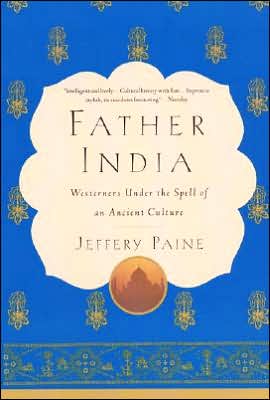

 |

|

The average rating for Father India based on 2 reviews is 3.5 stars.
Review # 1 was written on 2016-12-18 00:00:00 George Deal George DealForeigners, from time immemorial, have come to India for a variety of reasons - for trade, conquest, learning (a la Hsuan Tsang), or simply out of curiosity about the land and the people. But Jeffery Paine focuses on a small sub-set of these travelers - those who journeyed to India hoping to clarify aspects of their own personality, or of their home cultures, through encounter with an alien and exotic other. Paine presents detailed descriptions of about half a dozen of these encounters, the main thesis being that the East-West commerce has not been one-way, but a true two-way exchange of ideas and influences. The principal profiles are of Lord Curzon, Annie Besant, E. M. Forster, Christopher Isherwood, V. S. Naipaul and interestingly Mohandas Gandhi. But in addition, Paine also covers many others in some detail, including Carl Jung, Martin Luther King, Madeleine Slade (Mira Behn), and Mirra Richards (the Mother of Aurobindo Ashram). Reading the book, one gets the impression that Paine started with a larger set of candidates for the main profiles, but having decided on the principal five or six, did not have the heart to excise the others. So a number of profiles remain, some only a few paragraphs long, others as long as the main profiles. Some stayed only for a short while; Isherwood for a short visit, which he hated, and Lord Curzon for the duration of his Viceroyalty. Others stayed for years if not decades: Annie Besant, and of course, Gandhi. But according to Paine, all were changed by the visit either in terms of self-understanding or their concept of their native cultures. A peculiarity of the book is Paine's borderline obsession with the sexual peccadilloes of his subjects. Forster was gay, and his efforts to find a discreet lover at the court of Dewas has its humorous moments. Isherwood too was omnivorous, and his vacillation between Southern California temptations and the Vedanta Institute gets extensive coverage. But on his hurried visit to India, which was to all purposes a disappointment to him, Paine implies that he was chaste. Madeleine Slade, the British admiral's daughter who became Gandhi's disciple, was chaste too but smoldered with repressed erotic desire, according to Paine. Sparks flew between Aurobindo and Mirra Richards too, but nothing definite is known about their intimate lives - which does not stop Paine from dropping innuendo and conjecture. And of course, Gandhi's experiments with chastity are too well-known to require repetition. Perhaps it was the loosening of moral restrictions and behavioral norms that allowed Westerners to imagine alternative lives in the tropics, including the erotic possibilities. At least that is what Paine seems to be implicating, though only in the case of Forster was this freedom actualized in physical intimacy. In summary, the concept of the book is wonderful - Westerners in search of self, rather than in search of the other - and on the whole, the main point is well made: that the West learned as much from India about itself through these and other travelers, as it taught India about modernity and progress. But India was not the active agent, not the creator of knowledge in this book. It is the passive instrument, a lens if you will, through which Westerners were better able to discern facets of themselves and their cultures. India did not teach, as much as the West learned, through a side-by-side examination of itself against something alien and exotic. |
Review # 2 was written on 2010-10-02 00:00:00 HEATHER ROSENBERG HEATHER ROSENBERGFather India is both fascinating and frustrating. Fascinating, because it deals with some extremely interesting people - Annie Besant, E. M. Forster, and Mohandas K. Gandhi among them - and the ways in which their lives and their thought changed in response to 19th- and 20th-century accommodations between India and the West.[return][return]Frustrating because covering eight individuals in some depth and many others in less depth in a book of just over 300 pages leads to a great deal of once-over-lightly. I was left wanting to know more, much more, about some of the figures, in particular Annie Besant, who went from militant atheist to apostle of Theososphy, and was even elected President of the Indian National Congress.[return][return]On the other hand, Jeffery Paine writes well and his material is fascinating. A book that leaves the reader wanting to know more is no bad thing, so I do recommend Father India for those wanting an introduction to complex interactions between colonial and post-colonial India and the West. |
CAN'T FIND WHAT YOU'RE LOOKING FOR? CLICK HERE!!!